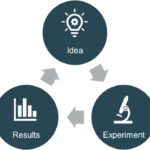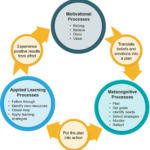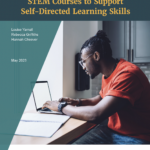
Putting Learners in Charge: A Self-Directed Learning Instructional Model
Collaborative researcher Louise Yarnall recently presented a new Self-Directed Learning Instructional Model at the annual symposium of the International Society for Self-Directed Learning ...

Supporting Student Success in Online Courses: Insights from Students and Faculty
How can instructors help students navigate the unique challenges of learning in a virtual environment? Explore key takeaways from the Collaborative's Spring 2025 public webinar ...

Fostering Student Connection and Growth Mindsets: A Q&A with Meghan McIntyre
Meghan McIntyre, a senior professor of mathematics at Wake Technical Community College in North Carolina, is no stranger to online learning or employing innovative strategies to engage her students. Meghan’s work with the Postsecondary Teaching with Technology Collaborative (the Collaborative) builds on her earlier efforts to improve online learning for ...

Learning Environments That Support Motivation: A Q&A With Tony Perez
Tony Perez is a professor in the Department of STEM Education and Professional Studies at Old Dominion University in Virginia and director of the university’s Motivation, Identity, and Learning Lab (MilLab). In his work, Perez focuses on how STEM instructors can support adaptive, positive forms of motivation by shifting away ...

Researchers, Practitioners, and Collaborative Members Connect at DREAM 2025
The Postsecondary Teaching with Technology Collaborative shared promising strategies for improving student outcomes in online courses to a standing-room-only audience at the 2025 annual DREAM conference in Philadelphia in February ...

Listening to Students: Experiences of SDL in Online Courses
As part of the Collaborative’s efforts to foster and support students’ self-directed learning (SDL) in online courses, we have explored the research literature, consulted experts, collaborated with our college partners, and gathered perspectives from administrators, staff, and faculty ...

Practitioners Leading the Way: Developing a Model for Self-Directed Learning in Online Courses
In online courses, students are expected to take more ownership of planning their learning approaches and study methods, organizing their time, seeking help, and following through on coursework. In online STEM courses, these expectations are compounded by disciplinary cultures that have traditionally emphasized meritocracy and competitiveness ...

Practical Strategies to Support Online STEM Students: Insights from the Collaborative’s Fall 2024 Webinar
As students increasingly enroll in online postsecondary STEM courses, instructors and students need new strategies to bolster academic success, particularly for students systemically marginalized in STEM and higher education ...

What Matters in Advancing Self-Directed Learning
A report on online learning based on responses from chief learning officers released last month found that a large majority of respondents have seen increasing demand for online options from students who are learning on campus ...

Embracing Change in Online Education: Insights from a Postsecondary Teaching with Technology Collaborative Fellow
Before joining the Postsecondary Teaching with Technology Collaborative as a fellow, my perspective on education was primarily that of a student: absorbing information without deeply considering the intricacies of teaching. However, this fellowship has been transformative. It has broadened my understanding of the myriad factors that shape effective learning experiences, ...

Improving Online STEM Education: Insights from a Postsecondary Teaching with Technology Collaborative Fellow
My college journey began like many do. I felt unconfident and underprepared due to a lack of a proper high school education. Like many others, I also witnessed the expansion of online courses in the wake of the pandemic, and I was forced to adapt to a new way of ...

Two New Publications Highlight Practical Examples of SDL Skill Support in Online Courses
With the huge growth in online courses since the start of the COVID-19 pandemic, faculty are increasingly aware that they need to adapt their teaching to the new environment of online instruction. But they may not know how to adapt and, in particular, how to support students’ skills in managing ...

Improving Outcomes for Learners of All Ages: A Conversation with Louise Yarnall
From the classroom to the workplace, lifelong learners face a complex set of challenges. In an increasingly tech-centered world, how can educators engage adult students and provide them with the practical and soft skills necessary to succeed in school and throughout their careers? ...

The Secret Sauce of Belonging, Engagement, and Help-Seeking: A Q&A with Carlton Fong
Carlton Fong, a professor of curriculum and instruction at Texas State University, has expertise in motivation, metacognition, and instructional design, with a focus on STEM courses. His work on student agency and how it helps students feel connected to college and motivates them to seek help ...

Happy New Year from the Postsecondary Collaborative!
We at the Postsecondary Collaborative are extraordinarily grateful to our institutional partners and advisors for your work with us in 2023 to support faculty and students in online STEM courses. We thank you for your continued partnership and inspiration ...

Tips for EdTech Developers to Break Into the Postsecondary Market
Scaling evidence-based education technology (edtech) products in the postsecondary market is challenging. Developers need to figure out how to break into classrooms long dominated by commercial publishers – and how to attract funding when investors tend to focus on the much larger and less fragmented K–12 market ...

Helping Your Students Not Just Survive but Thrive
During my first semester at Wake Tech college, I was not well acquainted with resources such as student success coaches, advisors, and tutoring services. However, once I became aware of them and started using them, I discovered how helpful they can be. New college students face a variety of challenges, ...

Why Interactive Learning is a Recipe for Student Motivation
Being a college student can be hard, especially for first-time students. We tend to think we will have everything together, but we are often wrong. We are starving for the learning we will experience in college, but we don’t quite have all of the study habits or knowledge about how ...

Perspectives from Postsecondary Collaborative Fellows
The Collaborative has started a fellowship program for students to gain their critical input as the primary users of online learning tools. This input will help the Collaborative ensure our products address the needs of the people and communities most impacted by them ...

Why and How to Measure Self-Directed Learning Skills
The ability to manage one’s own learning processes, known as self-directed learning (SDL), is a crucial factor in students’ academic success and one that learning scientists consider being open to improvement ...

Collaborating With Faculty on Rapid-Cycle Experiments: Testing Strategies for Developing Self-Directed Learning Skills
Online learning is here to stay. The benefits for students—especially increased flexibility and access—can contribute to their academic success. But students also encounter barriers to success, including feeling isolated and being unaware of where and how to seek help ...

Working Toward a Definition of Self-Directed Learning and a Unifying Framework to Support Students
The term self-directed learning—as we are currently using it within the Postsecondary Collaborative—encompasses an intricate set of mindsets and intrapersonal skills that students use to manage their learning. Though educators and researchers often think of them as discrete skills, we theorize that they are more powerful together than alone ...

How Can Instructors in Online STEM Courses Support Self-Directed Learning?
The COVID-19 pandemic showed that online learning is here to stay, but it also revealed knowledge gaps around how to support all students to learn effectively online. As a result, educators are now highly motivated to develop new models for online teaching and learning that build students’ skills and motivation ...

The Evolution of PimaOnline
Pima Community College in Arizona is a Hispanic-serving institution that enrolls about 43,000 students, many of whom are working and have families. With 40% of students fully online, and more in virtual and hybrid courses, the college ensures that online courses are not just pale imitations of in-person courses and ...

Making the Invisible Visible: Redesigning Interdisciplinary Tutoring in Two-Year Colleges
In 2020, Macomb Community College combined the college’s academic literacy and writing center and academic content tutoring center under one administrative team, allowing the college to reimagine tutoring services to better meet the needs of our students enrolled in remote, online, hybrid, and in-person courses. This shift—combined with the educational ...

How the Montgomery College Virtual Campus Is Bringing Support Services to Online Students
Montgomery College in Maryland serves 50,000 students on three campuses and has offered courses online for more than a decade. To reach their online students, the college created the Virtual Campus to bring comprehensive support services under one digital roof ...

Helping students attain skills that cannot be taught
Some skills can be learned and coached, but not taught. Instruction about skills like leadership, creativity, and self-directed learning reduces them to a formulaic recipe that the learner follows, without mastering the essential capabilities of recognizing the unique characteristics of a particular situation and of improvising an approach suited to ...

Promising Instructional Initiatives and New Ed-Tech Features Set the Stage for Upcoming Studies with Collaborative Partner Colleges And Universities
In spring 2020, the COVID-19 pandemic compelled colleges and universities to quickly move their courses online—despite evidence that students are less likely to complete and get good grades in online courses as compared to in-person learning ...

The Postsecondary Collaborative’s Blog
Welcome to the Collaborative’s new blog! This blog is one way we will foster conversation around the many complex issues around self-directed learning ...